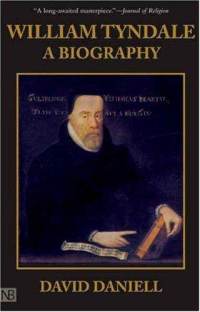There was a time that people died to make accessible a book we take for granted. I’m somewhat ashamed to write that sentence because I’m not sure this knowledge, as profound as it is, will change my behavior. But it should.

I have been working through David Daniell’s Yale University Press William Tyndale: A Biography. This biography, set in the history of the early 16th century, when Luther was hot, reminded me that it once was a crime to translate and publish the Bible into English. Men gave up their lives to translate, print, and distribute this book which I so take for granted. That I knew this before, I am sure. But I had pushed this uncomfortable knowledge to a dim and infrequently accessed corner of my brain.
Daniell’s biography is thorough and passionate. That it is thorough led me to skim those portions containing detail far beyond my level of interest. But its passion drew me in and kept me.
Daniell is Tyndale’s belated publicist. Tyndale has been given short notice over the years. We know of the King James Bible, the so-called ‘Authorized Version’. And we know of John Wycliffe because of the mission organization that borrowed his name. But Tyndale’s influence runs much more deep and wide than either of these.
Tyndale learned Greek when only a few Englishmen knew it, and Hebrew when almost none did. He translated from those languages, not from the Latin. His gift for written English has rarely been matched. Though the AV, produced 70 years after Tyndale, adopted much of its memorable language from his, in many cases where they differ, Tyndale sounds stunningly more modern. Tyndale would opt for clarity over some artificial notion of literality. The AV reversed this, and revered though it may be, it is revered mostly for phraseology introduced by Tyndale, and forgotten at the level of its own revisions.
Daniell notes:
One key to Tyndale’s genius is that his ear for how people spoke was so good. The English he was using was not the language of the scribe or lawyer or schoolmaster; it really was, at base, the spoken language of the people. In this he was unlike all other Bible translators, in English certainly. To give an example: David, as we saw, was ‘brown with goodly eyes’. The comment speaks down the centuries: the young man was a looker, and one can hear someone saying it. The whole sentence is ‘And he was brown with goodly eyes, and well favored in sight’. By contrast, this is what the Authorised Version has: ‘Now he was ruddy, and withal of a beautiful countenance, and goodly to look to.’ That is the sort of sentence that gets the Bible a bad name. No one, ever, spoke that, or could do, with a straight face. As a sentence, all it can do is live in a big book on a brass lectern and be read out on one of the Sundays after Trinity.
(Daniell’s prose isn’t half bad either, apparently.)
Tyndale, it is famously said, wanted the Bible to be accessible to the ploughboy as well as to the scholar. That, of course, was what the establishment feared. He succeeded. Memorably. And this led to his execution.
Of his legacy, Daniell laments:
We have at this point, however, to utter a cry of grief. It was of a scholar of this towering stature, leading all Europe in his knowledge of Greek, matched now by an equal command of Hebrew, uniquely gifted in tuning the sounds of the English language, who had achieved so much but who still had some of his greatest work to do, who was, soon after this, by a vicious, paltry and mean villain tricked into death. It is as if Shakespeare had been murdered by a real-life jealous Iago half-way through his life, and the great tragedies had never been written.
Daniell makes a convincing case that the comparison with Shakespeare is not inappropriate.
Tyndale died because he believed in the power inherent in the Word of God. God grant me the grace to share even a portion of that passion and conviction.

Jeff MacFarlane
I am struck by the straight up courage of men like Tyndale. I just finished reading ‘John Knox’ by Rosalind K. Marshall. Amazing.
Randy Greenwald
Absolutely. Not sure I’d hold up. Their faith was solid, and that infused their courage. Oh, to have a fraction of that faith.